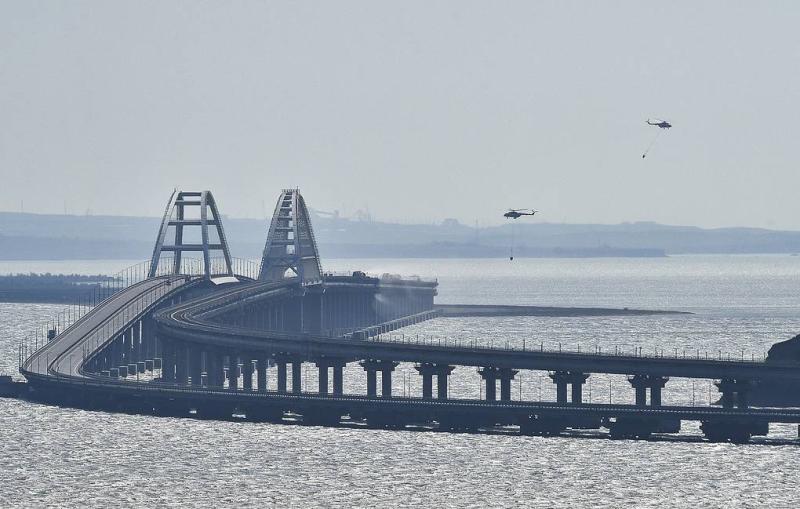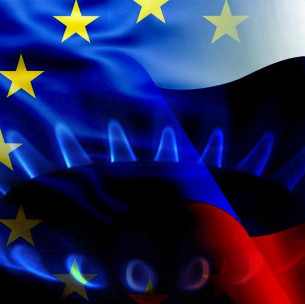
© AP Photo/TASS
Top stories from the Russian press on Monday, October 10th, prepared by TASS
Nezavisimaya Gazeta: Ukraine seeks to destroy Russian infrastructure while fighting to retake territories
Following a terrorist attack on the Crimean Bridge, the conflict between Russia and Ukraine acquired a new quality. Western-backed Kiev clearly is seeking to carry out major acts of sabotage deep inside Russia, while trying to retake territories, Nezavisimaya Gazeta writes.
In such a situation, the Kremlin’s decision to establish the Joint Group of Forces for the special military operation in Ukraine and appoint Aerospace Forces Commander Colonel General Sergey Surovikin to lead it looks logical.
Founder of the Donetsk People’s Republic’s (DPR) militia’s Vostok Battalion and military expert Alexander Khodakovsky believes that Surovikin "will have quicker access to the first person [supreme commander-in-chief] and an opportunity to convey his position directly, bypassing the top echelon of the military. "If it works, that’s fine, as those on the ground have a more impartial view of the situation than those in conference rooms," he added.
"Surovikin has a lot of combat work to do in terms of managing not only the Russian Armed Forces but also other security agencies, as well as in terms of ensuring cooperation between them, establishing effective communication channels, exchanging information and so on. There is no place for intrigues and squabbles here, which is what some journalists and politicians are talking about," military expert retired Lieutenant General Yury Netkachev pointed out.
Meanwhile, in his words, Kiev continues talks with the United Kingdom on a handover of nuclear weapons. Earlier, London allegedly promised to provide several tactical nuclear warheads to Kiev. "According to my data, [Ukrainian President Vladimir] Zelensky has given the command to prepare a dirty nuclear bomb for an attack on Russia," the expert noted.
Vedomosti: Putin, IAEA chief may discuss situation around Zaporozhye nuclear plant
Russian President Vladimir Putin and International Atomic Energy Agency (IAEA) Director General Rafael Grossi may hold talks as early as this week, a source close to the Russian presidential administration told Vedomosti. According to him, the negotiations may take place in St. Petersburg on Tuesday, October 11.
The Putin-Grossi talks will certainly focus on the situation around the Zaporozhye Nuclear Power Plant, said Dmitry Stefanovich, a researcher at the Russian Academy of Sciences’ Institute of World Economy and International Relations. Grossi, who earlier demonstrated a balanced and diplomatic approach, will try to find a consensus. According to Stefanovich, the IAEA is currently interested in maintaining its mission at the Zaporozhye NPP and creating a safe zone around the facility. A possible demilitarization is unlikely to be discussed, the expert noted, stressing that Russia was extremely negative about the idea.
The Zaporozhye Nuclear Power Plant is the largest one in Europe. In March, Russian troops took partial control of the Zaporozhye Region, including the power plant’s host city of Energodar. According to the Russian Defense Ministry, the nuclear facility has repeatedly come under Ukrainian attacks, which caused the shutdown of all of its energy units in late August. A 13-member IAEA mission led by Grossi visited the plant in early September. The agency issued a report later, calling for a safe zone around the plant and an end to military activities. On October 5, Putin ordered that the facility be taken into federal ownership.
Shelling attacks may make Grossi raise the issue of the types of weapons deployed near the Zaporozhye NPP and their operational ranges. Stefanovich noted. The IAEA’s interests align with Russia’s here as Moscow also wants attacks on the nuclear power plant to stop. Apart from the Zaporozhye NPP issue, Grossi will probably seek to discuss obstacles preventing the activities of Russia’s Rosatom State Nuclear Energy Corporation in foreign markets, the expert concluded.
Nezavisimaya Gazeta: US sees link between Ukrainian crisis and North Korea issue
The White House claims that the risk of nuclear war has never been so high since the Cuban missile crisis and blames the situation not only on Russia but also on North Korea. Pyongyang, in turn, points out that its missile launches come in response to provocations staged by the US and its allies holding military drills near the Korean Peninsula, Nezavisimaya Gazeta writes.
Experts from a number of US think tanks emphasize the need to recognize North Korea as a nuclear power and engage in talks with the country to reduce tensions. In the meantime, US President Joe Biden’s administration imposed sanctions on several businessmen and companies in Asia who assist North Korea in improving its weapons and strengthening its army. The move came after North Korea had held over 24 missile tests this year.
Ankit Panda, a Washington-based nuclear weapons expert, points out that a policy aimed at demanding North Korea’s denuclearization has failed. Andrey Lankov, a professor at Seoul’s Kookmin University, agrees, saying that "the US public wants its government to pursue an unattainable and dangerous dream." "However, the North Koreans have made it clear that they won’t play this game and it’s only possible to persuade them to think about limiting their nuclear arsenal by offering an insanely high reward," he added.
Head of the Korea and Mongolia Department at the Russian Academy of Sciences’ Institute of Oriental Studies Alexander Vorontsov noted that "from the beginning of the year, the Americans have been stubbornly predicting that the North Koreans will definitely conduct a nuclear test." "The US tried to make the United Nations Security Council discuss the issue. The envoys of Russia and China rejected the initiative, saying it was the US and its allies that were raising tensions. I would like to stress in this regard that relations between Russia and North Korea keep getting stronger, so much so that the idea to invite North Korean construction workers to Donbass has even been discussed, though no decisions have been made yet," the expert added.
Izvestia: EU may not have enough gas to get through winter months
Europe may run out of gas in January if Russian supplies stop, Izvestia writes, citing the Institute of Energy Problems. Russian gas deliveries continue via Ukraine and the TurkStream pipeline but these supplies will only postpone gas shortages until February, analysts say.
"Gas stocks in Europe’s underground storage facilities may indeed run out in January. However, it will happen only if several events coincide, namely that gas withdrawals from the storage sites rise sharply and LNG supplies dramatically decline," Deputy Director General of the National Energy Institute Alexander Frolov explained.
LNG supplies to Europe could possibly shrink if China eases its coronavirus restrictions and increases energy consumption, Frolov noted. As a result, prices on the Asian market will be higher and providers will make more money by sending gas to Asia, while Europe will lose a significant share of gas supplies, the analyst specified.
Director of Gas Issues at the National Energy Security Fund Alexey Grivach added that the European energy system would heavily depend on the weather conditions in the next heating season. If no rationing restrictions are introduced for gas consumption and gas withdrawal from storage facilities, they will run empty quite quickly if the weather is cold, he said. At the same time, under favorable weather conditions, the EU will largely be able to get through the heating season without major shocks, Grivach stressed.
One of the ways for Europe to resolve the issue of gas supply shortages could be to launch the undamaged thread of the Nord Stream 2 gas pipeline, President of the Association of Innovative Energy Entities Mikhail Smirnov noted.
Media: Russia retakes control of Sakhalin 1 project
Russian President Vladimir Putin signed a decree ordering the government to establish a new Russian operator to run the Sakhalin 1 oil and gas project. The project’s foreign participants - the United States’ Exxon Mobil, Japan’s Sodeco and India’s ONGC - were given a month to apply to join the new company. Under the decree, they can expect to get shares in proportion to what they currently own. If no applications are filed or they are rejected by the Russian government, the shares of foreign participants are to be sold within another four months and only Russian legal entities will be eligible to purchase them, Vedomosti notes.
The president’s hand was forced, said a source close to the Sakhalin 1 consortium. According to him, "all this time, the parties, namely Russia, kept initiating talks with Exxon to find a solution on its withdrawal from the project." "A lot of options were proposed but the US party did not agree to any conditions," the source added.
Exxon Mobil’s pullout is expected to make it possible to relaunch production and restore it to previous levels, Head of the NRA rating service Sergey Grishunin pointed out. In his view, as for the foreign participants, India’s ONGC Videsh and Japan’s Sodeco are highly likely to stay because Sakhalin 1 is a priority project for them.
Experts interviewed by Kommersant believe that Exxon will not claim its share, which is very likely to then go to Rosneft, making them the majority shareholder. Meanwhile, experts are pointing to technical difficulties and sanction obstacles that may prevent the relaunch of Sakhalin 1’s production. Restarting the project may take up to six months, said Sergey Kondratyev from the Institute for Energy and Finance Foundation.









